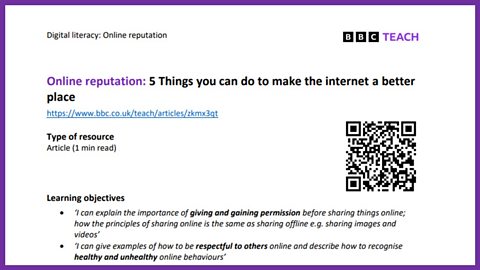Article summary
The article gives five tips to students on how to make the internet a better place.
They are: be nice, always get consent, look out for others, filter out the negative and protect your rep.
5 things you can do to help make the internet a better place

1. First and foremost - be nice to each other!
No matter what, always make the effort to be kind online, share the love!
2. Always get consent.
Want to post that photo of your bestie at the beach? Make sure that you get their permission before you post. Whether itÔÇÖs a picture or simply a tag, itÔÇÖs always good to check with them first - what if itÔÇÖs something they donÔÇÖt want putting out there?!
3. Look out for others.
We can all help one another and make being online more positive and a safe space by speaking up when someone is mean or rude online. ItÔÇÖs good to be supportive - and to feel supported - when navigating the online world.
4. Filter out the negative.
If you feel that something online isn't right, maybe it makes you think 'Ugh!' reporting inappropriate or illegal content and behaviour online can help to make the internet a more positive and safer space for everyone. You can make a difference!
5. Protect your rep!
The internet can be a force for good so seek out positive opportunities to create, engage and share; making the most of the online world. YouÔÇÖre representing you when you post ÔÇô so be the best version of you!
Article: 1min read
Learning objectives
(from the set out by the UK Council for Internet Safety)
ÔÇÿI can explain the importance of giving and gaining permission before sharing things online; how the principles of sharing online is the same as sharing offline e.g. sharing images and videosÔÇÖ
ÔÇÿI can give examples of how to be respectful to others online and describe how to recognise healthy and unhealthy online behavioursÔÇÖ
ÔÇÿI can demonstrate how to support others (including those who are having difficulties) onlineÔÇÖ
Glossary
- Post: to publish text, images or videos online or in a digital space
- Tag: to attach someone to something, to be able to identify someone
- Navigating: to lead in a certain direction
- Inappropriate: not proper in the circumstances
- Engage: to pay attention to and to be involved in or with
- Rep: your reputation
Topic introductions and starters
Before the video:
- Ask pupils, either in small groups or pairs, to write their own 5 top tips to make the internet a better place
After the video:
- Compare the articleÔÇÖs list to their own lists ÔÇô are they the same/different?
- Check pupilsÔÇÖ understanding of any new vocabulary: post, tag, navigating, inappropriate, illegal, engage, rep
- From the five headings, ask pupils to write their own top tip for each heading using a different example or scenario for each one
Discussion Points
Do you agree with the five main headings? Are these the most important aspects? Are there any other tips you can think of?
Be nice: Have you ever found yourself not being nice to someone online? Could you have done anything differently?
Consent: is it ever OK to post something without someoneÔÇÖs consent? What about parents posting pictures of their children? What could the negative consequences be if you post something without consent?
Look out for others: Have you ever stood up for someone online? Can it sometimes make things worse? What is the best way to be supportive?
Reporting negative content: Is it always helpful to report something negative? Should you just ignore/avoid it? How can you decide?
Protect your rep: What is a ÔÇÿrepÔÇÖ? Are people always truthful about themselves online? What positive things have you done online?
Fillers and fast finisher activities
- Create a hand-drawn cartoon illustration for each section of the article
- Use digital art tools/apps/software to make a digital poster covering the key points in the article
- Devise a catchy slogan or short poem that covers the main points of the article
- In small groups, roleplay various scenarios mentioned in the article ÔÇô try different approaches and resulting consequences and share with the class
Signposting potential homework activities
- Share the article with family and parents ÔÇô ask for their feedback and ideas around the issue. Are they different for adults and young people?
- Make a poster to display at home reminding you of the best ways to make the internet a better place for everyone
- Write a ÔÇÿday in the lifeÔÇÖ diary entry for a superhero that covers all the points in the article in a typical day of action
- Write a ÔÇÿpositivityÔÇÖ list of as many ways as you can think of to make the internet a better place.
For download/printing

More from: Online reputation
How to stay in control of your images. video
Video to to help students understand how to stay in control of their images and what to look out for when sharing content.

Share or beware? video
Actor and comedians Inel Tomlinson and Johnny Cochrane and presenters Ben Shires, and Ed Petrie talk about what they do and don't post online, and why.

How to delete your social media posts. document
Tips and advice on how to remove posts or take down stories on various social media platforms.
